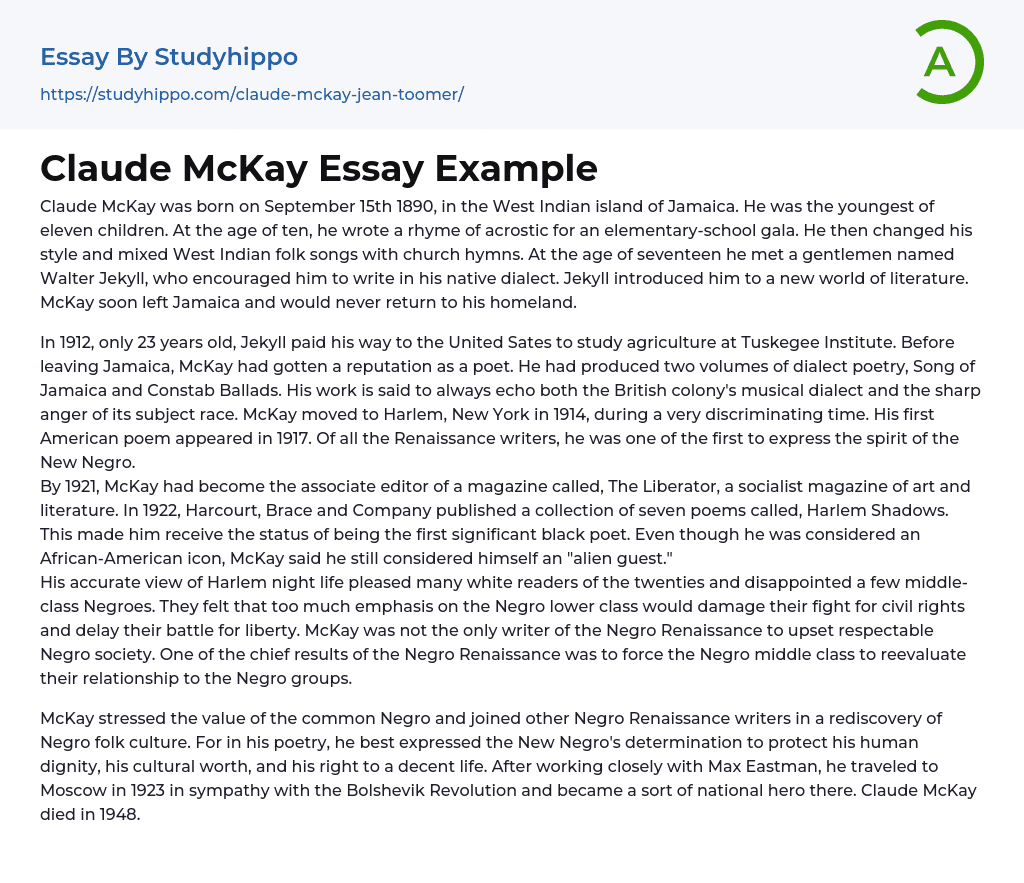Claude McKay, born on September 15th, 1890 in Jamaica, was the youngest of eleven children. At the age of ten, he created an acrostic rhyme for a school gala. As time went on, McKay began incorporating West Indian folk songs and church hymns into his writing style. When he turned seventeen, Walter Jekyll introduced him to writing in his native dialect and opened up a new world of literature. This meeting had such an impact on McKay that he decided to leave Jamaica forever and never come back.
In 1912, Jekyll, only 23 years old, traveled to the United States to study agriculture at Tuskegee Institute. Before leaving Jamaica, McKay had gained recognition as a poet, publishing two volumes of dialect poetry titled "Song of Jamaica" and "Constab Ballads." His poetry was known for capturing the musical dialect of the British colo
...ny and reflecting the anger of its marginalized race. McKay relocated to Harlem, New York in 1914 amidst a period of intense discrimination. His first American poem was published in 1917, making him one of the first Renaissance writers to embody the spirit of the New Negro. By 1921, McKay became the associate editor of The Liberator, a socialist magazine focused on art and literature. In 1922, his collection "Harlem Shadows" was published by Harcourt, Brace and Company, establishing him as the first significant black poet. Despite his status as an African-American icon, McKay still saw himself as an "alien guest." His portrayal of Harlem nightlife in his works pleased many white readers but disappointed some middle-class Negroes who feared it would hinder their civil rights efforts and delay their pursuit of liberty. McKay's defianc
of respectable Negro society was not unique among writers of the Negro Renaissance, which compelled the Negro middle class to reconsider their relationship with marginalized groups.
McKay, alongside other Renaissance writers, emphasized the importance of the ordinary African American and participated in a renaissance of African American folk culture. In his poetry, he effectively conveyed the New Negro's commitment to preserving their dignity, cultural value, and right to a decent life. Collaborating closely with Max Eastman, McKay journeyed to Moscow in 1923, showing solidarity with the Bolshevik Revolution and earning admiration as a national hero. McKay passed away in 1948.
During the end of 1921, McKay and Toomer were both writers of the Negro Renaissance who caused controversy within respectable Negro society. While McKay received stories from Jean Toomer, it is important to note that Toomer himself had an intriguing background. Born as Nathan Eugene Toomer in Washington, DC on December 26, 1894, he initially used his father's last name but later changed it to Jean when he embarked on his writing career. Toomer grew up in Washington with his racially mixed grandparents, although they could have been perceived as white. Despite attending multiple institutions of higher education, he never obtained a degree. In 1921, Toomer took on a substitute principal job at a Georgia school which allowed him the opportunity to explore and connect with his black heritage in the South.
Toomer's most significant literary contribution was Cane, which is a collection of poetry, short stories, and drama that delves into the culture of African-Americans in the southern United States. This work elevated his status as one of the most promising black writers during his time. Countee
Cullen praised Cane as "a genuine racial contribution, a classical depiction of reality." However, Toomer faced difficulties in publishing his later works as they were considered dull and uninteresting compared to Cane. The frustration from this inability to publish took a toll on him, leading to eye and kidney problems in the 1940s. Gradually, his mental and physical health declined until he passed away on March 30, 1967 due to arteriosclerosis. Despite actively writing until the end, Toomer's experimental writing style received occasional acclaim but was mostly ignored by African-American audiences.
- Boo Radley essays
- Genesis essays
- Richard iii essays
- Alice in Wonderland essays
- On the road essays
- Ozymandias essays
- The Nightingale essays
- Holden Caulfield essays
- Animal Farm essays
- 1984 essays
- A Hanging essays
- Shooting An Elephant essays
- A Tale Of Two Cities essays
- Adventures Of Huckleberry Finn essays
- Arthur Conan Doyle essays
- Brave New World essays
- Characters In Hamlet essays
- Characters In Romeo And Juliet essays
- Desdemona essays
- Diary Of A Wimpy Kid essays
- First-Person Narrative essays
- Frankenstein essays
- Heart Of Darkness essays
- Jane Eyre essays
- Jay Gatsby essays
- King Duncan essays
- Librarian essays
- Little Red Riding Hood essays
- Lord Of The Flies essays
- Silas Marner essays
- The Cask Of Amontillado essays
- The Catcher In The Rye essays
- The Crucible essays
- The Handmaid's Tale essays
- The Reader essays
- Virgil essays
- Wuthering Heights essays
- Candide essays
- Castle essays
- J. D. Salinger essays
- Ulysses essays
- Ethan Frome essays
- In Cold Blood essays
- Outliers essays
- Tuesdays With Morrie essays
- The Art of War essays
- Wife of Bath essays
- Huckleberry Finn essays
- The Lady With The Dog essays
- Great Expectations essays




